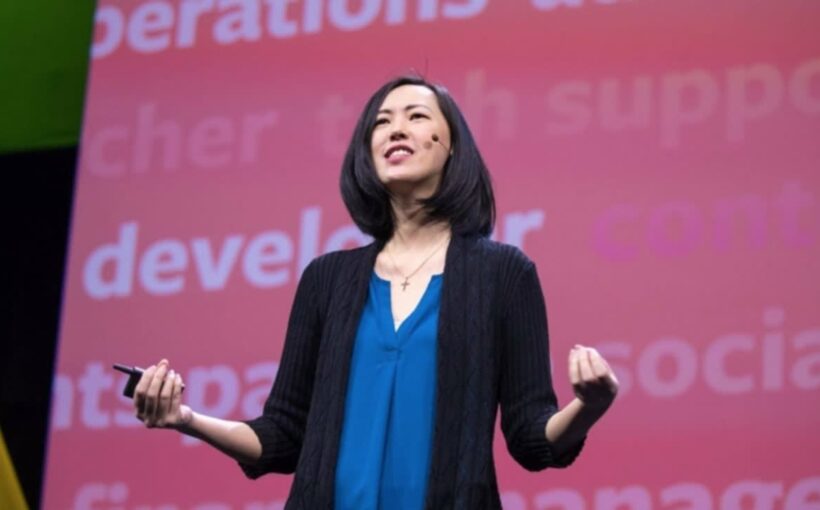This story is part of the Behind the Desk series, where CNBC Make It gets personal with successful business executives to find out everything from how they got to where they are to what makes them get out of bed in the morning to their daily routines.
Deb Liu's resume looked great on paper.
She spent 11 years at Facebook, including six-plus years at the executive level, building products like Facebook Marketplace and Facebook Credits. Before then, the Stanford business school graduate held product executive jobs at PayPal and eBay.
Yet for much of that time, she struggled internally. "I was extremely introverted and I had a really hard time connecting with people," Liu tells CNBC Make It.
In March, Liu was appointed the CEO of Ancestry.com, a consumer genealogy business valued at around $4.7 billion — making it the industry's largest company. Now, looking back, she says she wouldn't have been able to make the jump without some tough words eight years ago from her former boss, Facebook COO Sheryl Sandberg: "You can stop fighting now. You've won."
Sandberg was referencing Liu's combative streak, developed as a child growing up in small-town South Carolina in the late 1980s. Liu was one of the few Asian kids in school, and says she felt constantly alienated and discriminated against by the rest of the town.
"People would constantly come up to us on the street and say, 'Go back to where you came from,'" she says.
To cope, she resolved to constantly work harder to prove others wrong — but that attitude only worked for so long, she says. After Sandberg's wake up call in 2013, Liu started working with a career coach to develop a more effective leadership style: encouraging her team to make decisions, rather than fighting for her own decisions to be enacted.
Here, Liu discusses how her childhood struggles shaped her mindset, her conversation with Sandberg and the self-discovery mission that helped her land Ancestry's CEO job.
On growing up in small-town South Carolina: 'I spent most of my life trying to be unobjectionable and unnoticeable'
I was born in Queens, New York, but I grew up in a small town in South Carolina. My childhood was really challenging: The state of South Carolina was less than 1% Asian when I was growing up.
I think the hardest part was that when you look different than everybody else, people remind you that you are "the other." I spent most of my life trying to be unobjectionable and unnoticeable. I felt a level of discomfort and alienation for a long time.
Part of me was like, "I'm going to get out of this town, and I'm going to show them that I'm worth more than they think."
I would put my head down and work hard, so that no one would notice or say anything about me. It worked at engineering school at Duke University: I studied civil environmental engineering, where you get problem sets and never have to speak.
Then I went into consulting at Boston Consulting Group, and I hit a wall. My managers and partners kept saying, "You need to connect with people. You need to talk to the clients and be more open."
On the moment Sheryl Sandberg changed her life: 'It was really a profound moment'
It took me many years to learn to speak up and to find my voice. My fighting spirit served me well in some ways, but didn't serve me well in others. It can be very limiting if you are trying to connect with people.
Eventually, at Facebook [in 2013], Sheryl Sandberg pulled me aside after a meeting. She was like, "You can stop fighting now. You've won."
It was really a profound moment, because fueling myself with this level of fight was something that had worked for me. It was something that I had done for so long.
But she was right. It really was a moment that changed my life. I worked really hard on it with my career coach for a long time, after she said that.
On quitting her job to try something scary and new: 'Every CEO has to be a first-time CEO at some point'
I was at Facebook for 11 years, and I had many different jobs and careers there. About every two to three years, I picked up the next project and started something new.
But during Covid, I decided to go on a period of self-discovery and meet with as many people as I could. I would set up a couple half-hour meetings every few days, and I would just talk to people. I would try to explore what opportunities were out there.
It opened my eyes. I realized that at some point in your career, you're doing more than you're learning. I wasn't leaving Facebook because I was unhappy. I just wanted to explore what other opportunities were out there, and I wanted the next challenge to be something different.
Then, a recruiter named Jim Citrin reached out and said, "Hey would you like to interview for a public company CEO job?" I hesitated because I thought, "Why me?"
But then I realized that every CEO has to be a first-time CEO at some point. Why not me? So when the opportunity for Ancestry came along, I jumped at it.
This interview has been edited for length and clarity.
Don't miss more from Behind the Desk:
Jennifer Garner on helping lead her own start-up: ‘I’ve gotten much better at having hard conversations’
How Ellen Ochoa, the first Hispanic woman in space, dealt with 'people who didn't think I should be there'
Designer Vera Wang on starting her company at 40: 'I thought maybe it's just too late for me'
Source: Read Full Article
